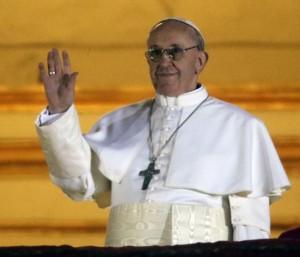New Pope Spotlights Questions about Church's Relationship with Military Dictatorship
By Hayes Brown
The election of Jorge Mario Cardinal Bergoglio as Pope Francis I has sparked new interest in the atrocities performed during Argentina’s period of military rule from 1976-1983. Francis is the first pope to have been elected from the Americas, which will more accurately reflect the primacy of the Roman Catholic Church in Latin America. That primacy, however, during the Cold War led to many dioceses throughout the region turning a blind eye to the atrocities of military governments. These right-wing governments, often taking power via coup, were supported by the United States and the church alike for their stand against Communism. Particularly devastating was the period known in Argentina as as “The Dirty War.” Beginning as a crackdown on armed left-wing guerrilla groups following a military coup in 1976, the regime soon expanded its focus, imprisoning and torturing anyone thought to hold leftist views or criticize the government. Women who were pregnant at the time of their incarceration were allowed to bring their children to term, before being “transferred” — a euphemism used by the junta for execution — drugged and tossed from airplanes into the ocean. All-told, an estimated 30,000 civilians were “disappeared” by the government. Years later, one priest told a panel of judges that the church at the time was “scandalously close to the dictatorship” in turning a blind eye, “to such an extent that I would say it was of a sinful degree.” Former Argentine dictator Jorge Videla claimed in an interview years removed from power that the Church was definitely “consulted” throughout the crackdown. That included offering their good offices and discouraging families from searching for relatives who had “disappeared.” That link was much stronger in Argentina than in neighboring dictatorships in Brazil and Chile: “Patriotism came to be associated with Catholicism,” said Kenneth P. Serbin, a history professor at the University of San Diego who has written about the Roman Catholic Church in South America. “So it was almost natural for the Argentine clergy to come to the defense of the authoritarian regime.”That tie has been a stain on Catholicism in Argentina ever since. The Argentine Catholic Church issued a document in 1996 admitting they had made “insufficient efforts” to prevent atrocities. When Pope John Paul II issued a blanket apology for church abuses throughout the ages in 2000, Bergoglio — by then the archbishop of Buenos Aires — insisted that Argentine Catholic officials wear garments symbolizing penance for sins committed by the clergy during the military dictatorship. Bergoglio’s precise role during the Dirty War is still clouded. In 2005, when he was first considered as a possible replacement for John Paul II, a human rights activist accused Bergoglio of aiding in the military’s kidnapping of two Jesuits, filing criminal charges in a Buenos Aires court. That case has since not moved forward, though claims exist that he actively prevented human rights groups from finding political prisoners. However, at least one woman, former Buenos Aires Ombudsman Alicia de Olivia, has come forward to say that Bergoglio hid her from the military government during the crackdown.
|
.
Any original material on these pages is copyright © BishopAccountability.org 2004. Reproduce freely with attribution.
